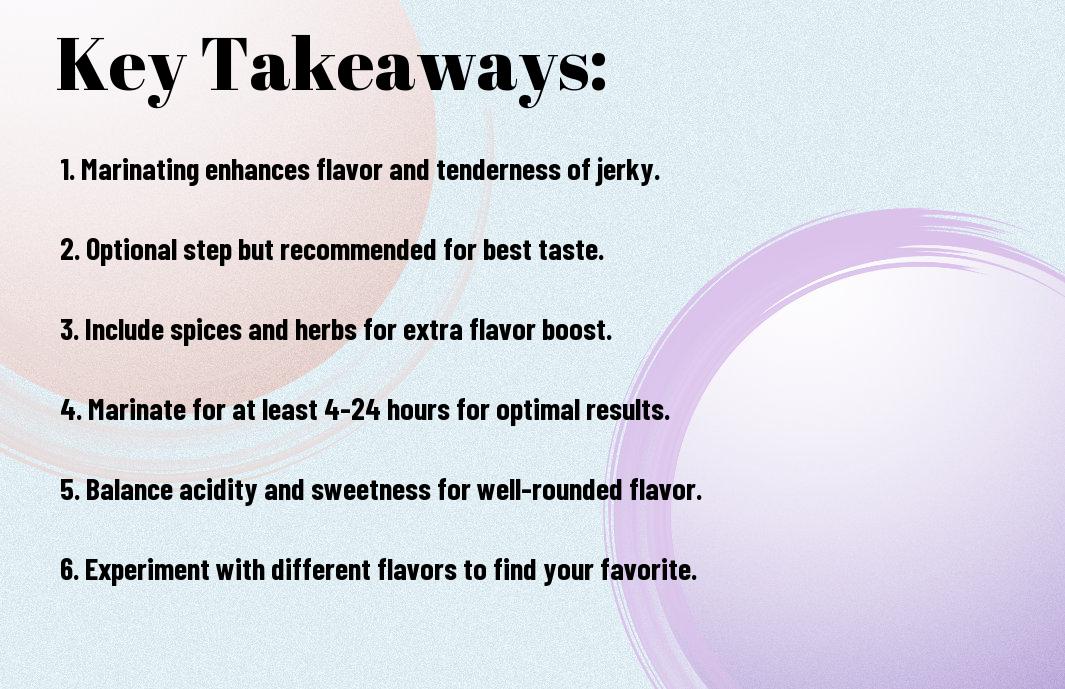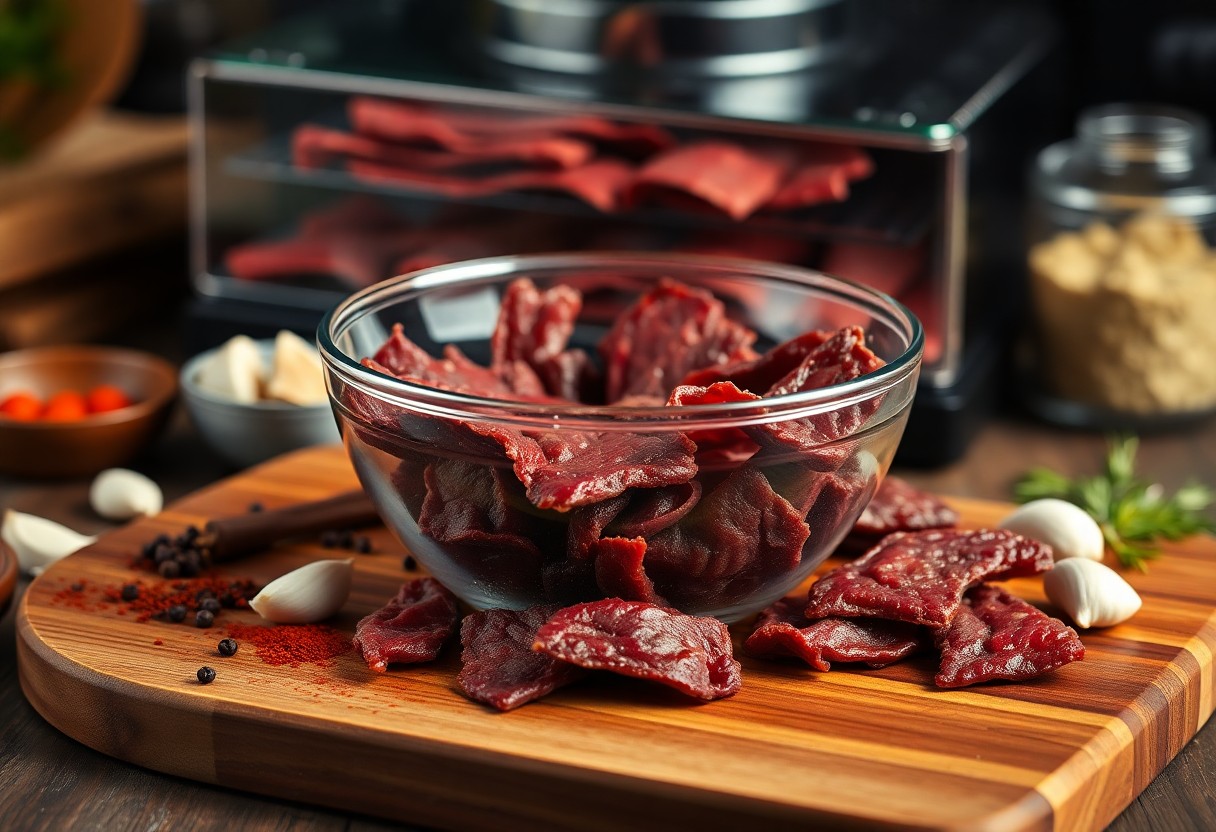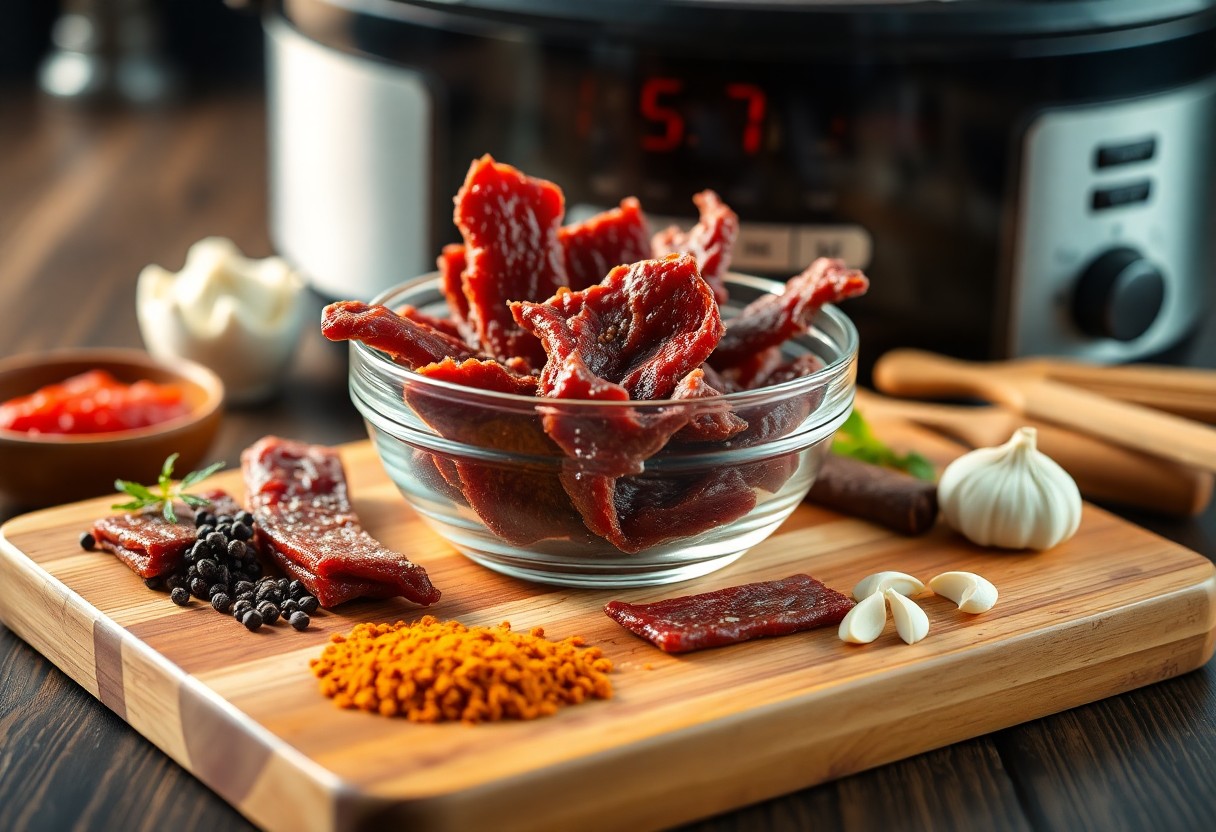Dehydrating your own jerky can be a rewarding experience, but understanding whether marinating is necessary can enhance the flavors. You might wonder if skipping this step is acceptable, or if it results in bland meat. Marinating can add deep, delicious flavors and tenderize the meat, leading to a more enjoyable overall result. Additionally, using the right marinade and techniques can help to ensure your jerky is safe to eat, preventing the growth of harmful bacteria during the drying process. Explore the options available to maximize your jerky-making success!
Key Takeaways:
- Marinating jerky can enhance flavors, making it more enjoyable and elevating its overall taste profile.
- While marinating adds flavor, it is not mandatory; dehydrating raw meat without marination can still yield tasty jerky.
- Experimenting with different marinades and spices can help achieve unique flavor combinations tailored to personal preferences.


Understanding Jerky Marination
A good understanding of jerky marination can elevate your jerky-making process significantly. Marinating adds flavor, tenderness, and preserves the meat, creating a delicious and satisfying snack. Knowing how to marinate correctly makes all the difference in achieving the best texture and taste.
The Purpose of Marinating
Above all, marinating serves multiple purposes in jerky preparation, primarily enhancing flavor and improving the texture of the meat. A well-composed marinade penetrates the fibers, adding moisture and taste while also aiding in the preservation process by introducing acids and salt.
Types of Marinades
At this stage, you should be aware of the various types of marinades you can use. Here are some categories to consider:
| Type | Description |
|---|---|
| Acidic Marinades | Utilize vinegar or citrus to tenderize the meat. |
| Salty Marinades | Enhance flavor and preserve with salt or soy sauce. |
| Sweet Marinades | Add sweetness using honey, sugar, or maple syrup. |
| Herb and Spice Marinades | Infuse flavors with herbs and spices for complexity. |
| Experimentation | Combining types for unique flavors can yield great results. |
- Experimentation is key to finding the right balance.
- Acidic marinades work best for tenderization.
- Salty marinades add vital flavor and preservation.
- Sweet marinades can balance intense flavors.
- After testing various mixes, you’ll discover your preferred taste.
Marination not only enhances the overall flavor profile but also can affect the final texture of the jerky. Choosing the right combination of ingredients can make your jerky not only taste great but remain tender and enjoyable. Don’t hesitate to explore unique combinations that reflect your taste preferences. Aim for a balance that suits your palate.
| Ingredient Type | Common Uses |
|---|---|
| Vinegar | Tenderizing and adding tangy flavor. |
| Soy Sauce | Strengthens umami flavor and preserves. |
| Garlic Powder | Enhances taste with aromatic flavors. |
| Red Pepper Flakes | Adds heat and depth to your marinade. |
| Herbs | Select fresh or dried for botanical notes. |
- Ingredient Type plays a vital role in flavoring.
- Herbs and spices can elevate your marinade.
- Vinegar offers tenderizing properties.
- Garlic powder adds depth to your jerky.
- After experimenting, tailor your custom blend!
Benefits of Marinating Jerky
Some of the primary benefits of marinating jerky include enhanced flavor, increased tenderness, and improved preservation. By soaking your meat in a flavorful blend of spices and liquids, you can elevate the overall taste, making your jerky more enjoyable. Additionally, certain marinades contain ingredients that contribute to a more succulent texture while also prolonging the shelf life of your finished product.
Flavor Enhancement
Against common belief, marinating isn’t just about keeping your jerky moist; it’s also the cornerstone of achieving a deeper, richer flavor. Marinades create a flavor infusion that seeps into your meat, making each bite more delicious. By experimenting with various herbs, spices, and marinade bases like soy sauce or vinegar, you can customize the taste of your jerky to perfectly meet your palate.
Tenderization and Preservation
Benefits of marinating include not only flavor but also improved tenderness and preservation. Certain ingredients, like acidic components found in vinegar or citrus, are effective at breaking down muscle fibers, yielding a more tender product. Moreover, marinades that contain salt or sugar can help inhibit bacterial growth, effectively extending your jerky’s shelf life while ensuring safety when stored.
Indeed, using marinades for tenderization can convert tough cuts of meat into delectable jerky. By incorporating ingredients such as soy sauce, vinegar, or pineapple juice, you can significantly enhance the meat’s texture and flavor. Additionally, the salt and sugar in your marinade play a vital role in preserving the jerky, making it safe for long storage while maintaining its quality. This dual benefit ensures that your jerky is not only tasty but also safe and enjoyable for an extended period.
When to Marinate Jerky
For the best flavor and texture, you should marinate your jerky after cutting the meat but before dehydrating. This allows the spices and seasonings to fully penetrate the meat, enhancing the overall taste. Each type of meat will benefit from different marinating times and methods, so tailor your approach to suit the specific cut and thickness of your chosen protein.
Time Considerations
Below are some general guidelines for marinating times: thin cuts of meat require less marinating time, around 2–4 hours, while thicker cuts may need up to 24 hours. Keep in mind that over-marinating can lead to overly salty or mushy jerky, so find a balance that works best for your recipe.
Meat Thickness and Type
One important factor to consider when marinating jerky is the thickness and type of the meat. Thicker cuts will absorb flavors more slowly, making them ideal for longer marination periods, whereas thin slices can quickly become overwhelmed by the marinade’s intensity.
Indeed, choosing the right meat thickness can significantly impact your jerky’s final flavor and texture. For example, slices about 1/4 inch thick allow for balanced flavor infusion without risking a soggy product. Additionally, some meats, like beef or venison, can stand up to stronger flavors, while pork or poultry may require a milder marinade to avoid overpowering the inherent taste of the meat. Understanding the specific requirements of your chosen meat ensures a delicious end product. Always test different thicknesses and marinating times to discover your perfect jerky recipe!
Alternatives to Marinating
Despite the popularity of marinating jerkies for enhanced flavor, there are effective alternatives that can deliver satisfying results. You can experiment with various seasoning techniques that allow your jerky to develop robust flavors without the lengthy marination process. These alternatives can save you time while still ensuring that your jerky turns out delicious and enjoyable.
Seasoning Prior to Dehydrating
An effective approach is to season your meat directly before you begin the dehydrating process. This method infuses your jerky with bold flavors as it dries, allowing the spices to permeate the meat. Choose a combination of spices, herbs, and salt to create a flavor profile that suits your taste preferences.
Using Dry Rubs
Using dry rubs is another excellent way to flavor your jerky without marination. This method involves applying a mixture of seasonings directly onto the surface of your meat, allowing for an even coating. With dry rubs, you can customize your jerky’s taste easily by controlling the spice levels or incorporating your favorite flavors.
Prior to applying dry rubs, ensure that your meat is adequately trimmed and patted dry. This helps the rub adhere better to the surface. Combine ingredients like salt, pepper, paprika, garlic powder, and chili flakes to create a delightful blend. Generously coat your meat and let it rest for about 30 minutes to allow the flavors to absorb. By using dry rubs, you unlock a world of flavor while maintaining a quick preparation process for your jerky.
Tips for Marinading Jerky
Your jerky can achieve maximum flavor through proper marinating techniques. To enhance your jerky experience, consider these tips:
- Choose fresh ingredients to ensure optimal flavor.
- Experiment with different spices and herbs for variety.
- Always use a non-reactive container for marinating.
- Adjust salt levels to prevent over-seasoning.
- Balance sweet and savory elements for depth.
The technique you use will significantly elevate your final product.
Ideal Ingredients for Marinades
By utilizing the right combination of ingredients, you can amplify the flavor profile of your jerky. Consider incorporating a mix of soy sauce, Worcestershire sauce, garlic powder, and black pepper for a balanced taste. Additionally, using natural sweeteners like honey or brown sugar can enhance the overall flavor while providing a touch of sweetness. Don’t hesitate to add your favorite spices and herbs to create a unique twist that reflects your personal taste.
Marination Time Guidelines
Ideal marination times can play a significant role in achieving delicious jerky. Depending on the thickness of the meat, the marination period can range from a few hours to a full day. As a general guideline, thinner cuts will benefit from a shorter marination time, typically 4 to 6 hours. In contrast, thicker cuts can sit for up to 24 hours. The key is to ensure sufficient time for the flavors to penetrate the meat while avoiding excessive marination, which can lead to an overly salty or mushy texture.
Indeed, you should be attentive to your marination time as it affects both the texture and flavor. A well-timed marinade will allow flavors to permeate deeply into your meat, giving you a balanced and savory jerky. If you leave your jerky in the marinade for too long, you risk making it overly salty or mushy, which can ruin its texture. Always keep an eye on the clock and use the recommended times to enjoy the best results.

Dehydrating Techniques
Keep in mind that successful jerky dehydration relies on the right technique. You have several methods at your disposal, including using a dehydrator, an oven, or even a smoker. Each method has its advantages, but ensuring consistent airflow and temperature will lead to the best flavors and textures in your jerky. Regardless of the technique you choose, pay close attention to the dehydration process to achieve perfect results.
Optimal Settings and Temperatures
Settings are important when using a dehydrator or an oven. Here’s a quick reference table for optimal settings:
Optimal Dehydrating Settings| Dehydrator Temperature | 160°F (71°C) |
| Oven Temperature | 175°F (80°C) |
| Average Drying Time | 4-8 Hours |
Monitoring Dehydration Process
On your journey to perfect jerky, monitoring the dehydration process is key. You should regularly check the jerky for texture and dryness. If you see any signs of moisture or if it feels too soft, give it more time. The goal is to achieve a flexible yet non-sticky texture. You might also want to sample a piece toward the end of the drying cycle to ensure it meets your flavor preferences.
Also, consider the importance of food safety during dehydration. Make sure your jerky reaches an internal temperature of at least 160°F (71°C) to eliminate any harmful bacteria. Proper airflow and spacing between pieces are equally crucial to avoid uneven dehydration. If you monitor these factors closely, you will have delicious jerky that is both safe and enjoyable.
Final Words
Conclusively, marinating your jerky before dehydrating can significantly enhance the flavor and tenderness, allowing you to personalize your snack experience. By experimenting with various marinades and timing, you can discover the perfect balance that suits your taste. Keeping in mind that marination should complement the natural characteristics of the meat you choose will further elevate your jerky-making process. Embrace this step, and you will undoubtedly enjoy tastier, more satisfying jerky that reflects your unique culinary preferences.
FAQ
Q: Do I have to marinate jerky before dehydrating it?
A: No, marinating jerky is not a necessity before dehydrating, but it is highly recommended. Marinating adds flavor and helps tenderize the meat, enhancing the overall taste and texture. If you prefer a more straightforward taste, you can dehydrate the meat without marinating.
Q: What are some common ingredients to include in a jerky marinade?
A: A typical jerky marinade may contain soy sauce, Worcestershire sauce, vinegar, or citrus juices for acidity. You can also add spices, herbs, garlic, sugar, and pepper for extra flavor. Customizing your marinade allows you to tailor the flavor profile to your liking.
Q: How long should I marinate the meat for the best results?
A: The optimal marinating time can vary based on the thickness of the meat and the intensity of flavor desired. Generally, marinating for 4 to 24 hours in the refrigerator is ideal. For thicker cuts, you may want to extend the marination time, while thinner slices might only need a few hours.
Q: Can I use store-bought marinades for jerky?
A: Absolutely! Store-bought marinades can save time and still impart great flavors to your jerky. Be sure to check the ingredients for any preservatives or additives if you prefer a more natural approach. You can also enhance store-bought marinades by adding your own spices or herbs.
Q: What are the benefits of marinating jerky before dehydrating?
A: Marinating jerky before dehydrating enhances flavor and can improve the texture by breaking down the meat fibers. It also adds moisture, which helps combat the drying process and can lead to a more palatable and flavorful end product. Incorporating acidity, such as vinegar or citrus, can also promote better preservation.
